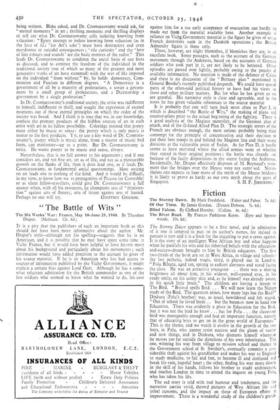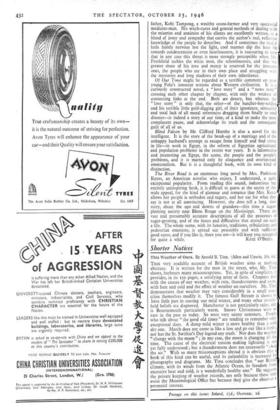Fiction
The Stormy Dawn appears to be a first novel, and in admiration of it one is tempted to pun on its author's names, for indeed its pasture is new and it is a book for the inquiring to put a cross against. It is the story of an intelligent West African boy and what happens when he parallels his wits and his inherited beliefs with the education- and-success-dream brought to him by British educators. The first two-thirds of the book are set in West Africa, in village and schools ; the last pathetic, indeed tragic, third, is played out in London. " Folu Bibuna, aged ten, sprang to radiant alermess and stood facing the class. He was an attractive youngster . . there was a shining brightness all about him, in his wideset, well-opened eyes, in his ready smile, on his satiny skin and, as he himself was already aware, in his quick little brain." The children are having a lesson an The Bird. " B-i-r-d spells Bird. . . . We will now learn the Nature study of the Bird. The question arises, how many legs has the Bird?" Dinkura (Folu's brother) was, as usual, bewildered and felt stupid. " Out of school he loved" birds .. but the business now in hand was Education. There was evidently a place in Education for the Bird, but it was not the bird he knew . .. but for Fain . . . the classroom bird was manageable enough and had an important function, namely that of educating boys to get on in the great world of Europeans." This is the theme, and we watch it evolve in the growth of the two boys, in Folu, who cannot resist success and the gleam of vanity and new things, and in Dinkura, who distrusts himself whenever he moves too far outside the directions of his own inheritance. The one, winning his way from village to mission school and thence to the Government school of St. Swithin's, eventually commits a con- siderable theft against his grandfather and makes his way to England to study medicine, to fail and fret, to become ill and confused and • break his vain, hopeful heart ; the other, finding his way more slowly in the skill of his hands, follows his brother to study architecture, and reaches London • in time to attend the inquest on young Folu, who has taken his life.
The sad story it told with real humour and tenderness, and the narration carries vivid, shrewd pictures of West African life 3nd
tribal customs, And the impact on these of European efforts at improvement. There is a wonderful study of the children's grand-
father, Kobi Tampong, a wealthy cocoa-farmer and very successful medicine-man. His witch-cures and general methods of dealing with the miseries and anxieties of his clients are excellently written, in a blend of irony and sympathy that carries the author's real, reflective knowledge of the people he describes. And if sometimes the reader feels faintly nervous lest the light, cool manner dip the least bit towards condescension or even facetiousness, it is reassuring to note that in any case this threat is more strongly perceptible when Mr. Freshfield tackles the white men, the schoolmasters, and that the greater share of his love and mercy is reserved for the innocent ones, the people who are in their own place and struggling with the mysteries and long shadows of their own inheritance.
Of Our Time might be regarded as a terrible comment on poor young Folu's innocent notions about Western civilisation. It is a curiously constructed novel, a " love story " and a " news story " crossing each other chapter by chapter, with only the weakest of connecting links at the end. Both are dreary, but whereas the " love story " is only that, the other—of the butcher-boy-soldiet1 and his terrible little gold-digging girl, of their ignoiance, sensuality and total lack of all moral references dragging them finally to total disaster—is indeed a story of our time, of a kind to make the most complacent pause, and acknowledge its truth and the consequent guilt of all of us.
Blind Falcon by Mr. Clifford Hornby is also a novel for the intelligent. It is the story of the break-up of a marriage and of the unhappy husband's attempt to escape from himself and find virtue in life—in work in Egypt, in the reform of Egyptian agricultural and population problems in the recent war years. It is informative and interesting on Egypt, the scene, the people and the people's problems, and it is marred only by eloquence and overstressed emotionalisM. But it is a thoughtful book, with its own kind of distinction.
The River Road is an enormous long novel by Mrs. Parkinson Keyes, an American novelist who enjoys, I understand, a quite exceptional popularity. From reading this sound, industrious but entirely uninspiring book, it is difficult to guess at the secret of this wide appeal, for the kind of glamour and romance that Mrs. Keyes allows her people is orthodox and sugary, and her ear for what they say is not at all convincing. However, she does tell a long, slim story, about the ups and downs of grandees—this time a sugar- planting society near Baton Rouge on the Mississippi. There are vast and presumably accurate descriptions of all the processes of sugar-growing, and of the feasts and difficulties that attend on such a life. The whole scene, with its luxuries, traditions, tribulations and pedestrian emotions, is spread out peaceably and with sufficient good sense, and if you like it, there you are—it will keep you occupied































 Previous page
Previous page